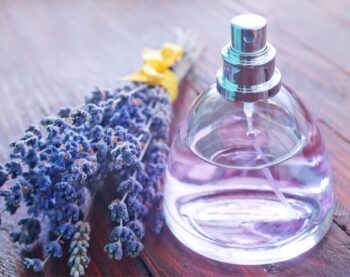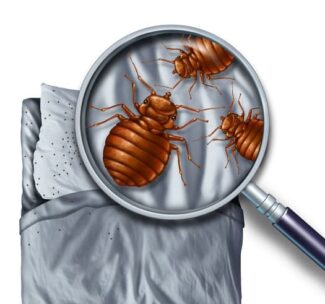Lavender can make any room smell nicer. But aside from that, people claim that lavender and other essential oils have different medicinal and household uses. Many of these claims are exaggerated, but some are true.
No studies have been done on lavender for bed bugs. However, lavender does have a toxic effect if ingested or applied in sufficient quantities. This same toxic effect in other essential oils can kill bed bugs on direct contact, and help repel them too.
Essential oils are natural, but that doesn’t mean they’re not toxic—which is a contradiction that many people don’t realize. But it’s their toxicity that can make them so useful for killing bed bugs.
Does Lavender Oil Repel Bed Bugs?
There haven’t been any studies specifically on whether lavender repels bed bugs. There might be lots of anecdotal evidence out there, but that isn’t good enough.
However, the mechanism by which lavender would work—its toxicity—is the same mechanism by which other essential oils work.
The Journal of Economic Entomology found that many essential oils kill bed bugs on contact. That being said, they weren’t as effective as other commonly available silicone oils or paraffin oil.
Another study in the journal Insects tested a commercially-available essential oil spray to see if it worked. This spray contained many different oils, including geranium oil and cedar oil.
They found that it was highly effective upon contact. Even so, the team only managed to get rid of bed bugs in 22% of the apartments they treated.
In practice, bed bugs have a well-developed sense of smell. They can smell the unique scent of a host, and can even tell what blood type you have. So, if they smell something that’s going to be toxic to them, they’re going to head in the opposite direction.
When you spread desiccant dust or pesticides, bed bugs will avoid the area where you put them. That’s why it’s important to cover every single spot where they might go. If you can thoroughly coat your living space with repellent, then they would stay away. But this is easier said than done.
What Are Essential Oils?
They’re a kind of oil that contains the ‘essence’ of a plant’s fragrance, hence the name ‘essential’ oil. They’re distilled from plant matter and are used in aromatherapy.
This distillation process is a little more complicated than just steaming something up and collecting the water. You need specialist chemical equipment. However, people have been doing it for thousands of years.

All essential oils have different properties. Most are toxic, meaning that they’ll hurt you if ingested. Applied neat, many will cause stinging or burning sensations.
Their toxicity is the reason why people think they can repel or kill insects like bed bugs. However, some essential oils do have favorable properties like being antibacterial or fungicidal. Besides that, they’re pleasant-smelling.
Why Don’t Bed Bugs Like Lavender?
Bed bugs don’t like lavender and other essential oils because they’re toxic.
Now, this is a touchy point for some people. But upon ingestion, essential oils are poisonous. Essential oils can poison cats, dogs, children, and adults (although adults are less severely affected due to being bigger).
Even external use can lead to severe reactions, which is why they should only be applied with a carrier oil. Essential oils can cause rashes and hives on the skin, and if too much is absorbed, have poisonous effects as if they were ingested.
Can You Use Real Lavender?
Yes, you can, although it won’t work as well as a spray.
According to the ASPCA, it’s not just lavender oil that’s toxic to animals. The actual plant itself is toxic to dogs, cats, and horses on ingestion. It causes nausea and vomiting and puts the animal off their food (which is exactly what you want to do to a bed bug).
The only problem with using real, lavender to repel bed bugs is that they’ll easily avoid it. Bed bugs will skirt around things that they don’t like, just as we described above.
Even if you sprinkle lavender all over your floor, bed bugs are only as big as apple pips. They can easily navigate their way through natural lavender sprinkled around. It’s far better to use a spray, because a spray gets everywhere (well, everywhere that you spray it).
Not only that, but essential oils are distilled and stronger versions of the plant they’re made from. They take the chemicals that produce scents and reactions through distillation and get rid of all the bits that don’t do anything.
So, the effect would be more noticeable if you used an essential oil spray rather than the ‘real thing’.
Lavender Powder for Bed Bugs
When we say ‘lavender powder,’ we don’t mean detergent. We mean the real thing. You can buy bulk packs of lavender powder online for relatively cheap prices.
The idea is that it might repel them, although it won’t work like diatomaceous earth, because that works by being very abrasive. Lavender powder wouldn’t do the same. If it were to work, it would repel the bed bugs rather than kill them by drying them out.
At the time of writing, there aren’t any scientific studies that have looked at lavender powder. It’s rarely used, plus there isn’t much research on lavender.
On the plus side, it would be a good long-term repellent because it wouldn’t dry up like a spray. So it might be worth a go, but it might also not work.
Do Lavender-Scented Candles Work?
You might also think that lavender-scented candles would work. If they did, it would be perfect—the smell would permeate the whole room, and repel all the bed bugs at once. Unfortunately, it doesn’t work like that.
If you have a severe allergy to essential oils, then just inhaling them will be enough to trigger your allergies. But lavender-scented candles aren’t the same as essential oils and are nowhere near as concentrated. So, somebody with an allergy wouldn’t have the same reaction to a lavender scent as they would to the essential oil.
Not only that, but the scent wouldn’t be able to permeate every part of the home. Sure, it could spread throughout the air in your room. But bed bugs like to live in cracks and crevices.
That’s why you’ll find them inside electrical outlets and in the folds of your mattress. Even if candles did work, then, they wouldn’t reach bed bugs that are hiding in their harborages.
Bed Bugs and Lavender Dryer Sheets
Dr. Myles Bader is an author, specifically the author of the book Natural Solutions to Things That Bug You. In his book, he suggests using lavender dryer sheets to get rid of bed bugs.
Dryer sheets are just that, small sheets of paper that you can put in the dryer to give your clothes a nicer fragrance. Where he came up with the idea, it’s impossible to say, but it doesn’t work.

It sounds like it might make sense. Lavender can repel bed bugs, so why can’t things with lavender in them? The problem is that manufacturers don’t use fresh lavender if they use lavender at all.
Unless you could coat every single surface of your home in dryer sheets, then they would do nothing, because the bed bugs would walk around them.
There are many DIY solutions to get rid of bed bugs. Making a lavender spray is just one of them.
How to Make Lavender Oil Spray for Bed Bugs
Making your own homemade bed bug repellent is surprisingly easy, and effective too. The trick is to get the oil to mix with the water. This is what makes an oil an oil—the definition is any liquid that’s hydrophobic, which means ‘afraid of water.’
Oils and water will separate, with the oil gradually moving in bubbles to the top. If you leave it for long enough, the oil and water will completely separate.
How to Mix Lavender Oil with Water
As we said, oils are hydrophobic. This means that you can shake and shake and shake your spray as much as you want. But the oil will separate again no matter how much you do.
You have to make the oil ‘hydrophilic,’ which means ‘water-loving.’ Fortunately, there are a host of chemicals—lab-made and natural—that can make water and oils mix. These are called dispersants.
Probably the easiest and cheapest for you to get your hands on is basic dish soap. Dish soap is manufactured so that it can pick up grease and oil from your dishes/cutlery etc. and disperse it throughout the water you use to wash.
The more dish soap you use, the more fats and oils the water can hold. You can try mixing just a drop of dish soap with lavender oil in your water. This may be enough on its own.
If you need more, feel free to add more—by picking a natural dish soap, you don’t have to worry about ‘chemicals’ no matter how much you use.
Ammonia is a commonly available dispersant too, although the smell wouldn’t be very nice. You could also consider using bleach, which would also be good for cleaning around your mattress, as well as killing any bed bugs.
You might also have heard about carrier oils, and these are a big part of using essential oils. A carrier oil is a cheap, inert oil that ‘carries’ the essential oil.
It’s a way of diluting strong essential oils like lavender. This wouldn’t be a good way to create an essential oil spray. It’s best to stick to water.
Using dish soap, then, is the best method. Use a ratio of 20 parts water to 1 part essential oil for a roughly 5% solution, which is more than enough to kill a bed bug. Add a few drops of dish soap and mix. Your spray will then be ready to use.
How to Get Rid of Bed Bugs with Lavender Oil
Start by spraying every single area that you see bed bugs. If you know that there’s a congregation spot underneath your mattress, start by spraying there.
Use quite a lot on these areas, because bed bugs use scent markers to remember where they live. By destroying those scent markers, and replacing them with something toxic to them, you should be able to make them scatter. Likely spots include:
- The underneath of your mattress, between your mattress and your box spring
- Inside or behind your headboard
- Inside the box spring itself
- Behind the sideboard
Once you’re done with these hotspots, spray the entire mattress from top to bottom. You don’t need to use a lot, but make sure that the whole mattress is covered.
Pay special attention to folds and creases, which are where they love to hide. This will discourage them from traveling to reach you.
Give a general spray around the room. Cover every part of the floor, as well as the sideboards and soft furnishings e.g. curtains and carpets.
You should also spray any bedside furniture. Pay special attention to the inside of drawers, as well as underneath the furniture itself.
Most importantly, make sure to spray regularly. No matter how you choose to try and get rid of them, bed bugs will easily survive just one application of a spray, pesticide or powder.
However, if you spray every week, this will provide a consistent repellent. Combine using lavender oil spray with regular vacuum cleaning, tidying, and changing your sheets. This may very slowly get rid of your infestation.
Avoid Skin Irritation Using Essential Oils
It’s very important that you use protective equipment when you spray essential oils.
Like we said above, they can be exceptionally toxic. They’re unlikely to cause you any complications if you’ve diluted them properly. But some people are allergic to them.
Some people will experience an immune response that includes rashes, burning sensations, and worse. For example, a paper published in the journal Complementary Therapies in Nursing and Midwifery detailed two allergic reactions that occurred during aromatherapy classes.
It’s therefore essential to protect yourself. You can do this by wearing gloves when you wipe down surfaces, and wearing a face mask so that you can avoid breathing in fumes from cleaning products.
Whether you think they’re necessary or not, you’ll be killing and cleaning up bed bugs. Surely that’s disgusting enough to want to wear gloves and a face mask anyway!
What Other Essential Oils Could I Use?
Lavender oil isn’t the only oil that people use. It’s probably not even the best for the job.
The best that you could consider using is tea tree oil. Tea tree oil is incredibly toxic if ingested, and can even cause death. Tea tree oil kills bed bugs on contact, just like lavender oil.
It’s also a disinfectant because it kills both bacteria and fungus. That’s why it’s found in so many cleaning products.
Unsurprisingly, it smells a little bit more like a cleaning product than lavender does, too. It smells almost a little like strong pine, and some people love it, but some people hate it. You could also use:
- Geranium oil
- Wintergreen oil
- Eucalyptus oil
- Cedar leaf oil
Each of these oils is toxic and should never be ingested. That’s why they might work against bed bugs. Do bear in mind, though, that there aren’t any studies on how effective they are.
Should I Use Lavender Oil to Kill Bed Bugs?
Bed bugs will find a way to return unless you manage to kill them all. Bed bug infestations can grow very quickly. That means that if only two or three bed bugs survive your treatment, you’ll have a fully-fledged infestation again in just a couple of months.
Either that or you have to commit yourself to spraying oil around your home every week for the rest of your life. Lavender oil only kills on contact, and bed bugs are good at avoiding things.
With consistent application and combination with other methods, a lavender oil spray should be enough to keep an infestation under control.
But considering that there are better ways to kill bed bugs—and kill them, getting rid of them for good—this might at best be a Plan B.
What If It Doesn’t Work?
There’s a good chance that using essential oils won’t work. This could be either because you didn’t spray often enough, or you didn’t spray thoroughly enough.
Or, it could be that the bugs are sufficiently spread out in your home that there were some harborages that you weren’t aware of, e.g., in electrical sockets or inside the walls. These locations definitely shouldn’t/can’t be sprayed. So what should you do if these methods don’t work?
The first and most obvious thing you could do is call an exterminator. However, bed bugs are becoming increasingly resistant to pesticides. The closest you’ll get to a guarantee that they’ll be dead is heat treatment.
Bed bugs can’t survive heatwave-level temperatures for a long time, and exterminators use heat treatment to heat your room/home to 120+ degrees. If it doesn’t work, you should consider combining it with other options:
- Regularly spreading diatomaceous earth across the floor.
- Fitting a mattress encasement. These are like mattress protectors but specifically designed so that bed bugs can’t get in or out. They’ll starve to death, although this might take a year.
- Regular vacuum cleaning and tidying, to prevent the infestation from getting worse. Vacuum the mattress and box spring for best results.
It can take a long time to get rid of bed bugs completely, but it’s possible.

